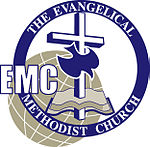Evangelical Methodist Church
| Evangelical Methodist Church | |
|---|---|

Evangelical Methodist Church International logo
|
|
| Classification | Protestant (Methodist) |
| Orientation | Evangelical, Holiness |
| Polity | Congregational-Connectional |
| Associations | Christian Holiness Partnership, National Association of Evangelicals |
| Region | Worldwide: North American Conference divided into two Districts (USA and Canada) and Mexico Missions Conference. |
| Headquarters | Indianapolis, Indiana |
| Origin | 1946 |
| Separated from | The Methodist Church |
| Merger of | The People's Methodist Church (1962), Evangel Church (1960) |
| Separations | Evangelical (Independent) Methodist Churches (1953), Bethel Methodist Church (1989), National Association of Wesleyan Evangelicals (2010) |
| Congregations | Worldwide 232 |
| Members | Approx. 16,150 |
The Evangelical Methodist Church (EMC) is a Christian denomination in the Wesleyan-Holiness tradition headquartered in Indianapolis, Indiana. The denomination reported 232 churches in the United States, Mexico, Burma/Myanmar, Canada, Philippines and several European and African nations in 2016, and a total of 16,150 members worldwide with about 8,600 of them in the United States.
The EMC describes itself as a culturally conservative, evangelical church that is "fundamental in belief, pre-millennial regarding the second coming, missionary in outlook, evangelistic in endeavor, cooperative in spirit, and Wesleyan in doctrine."
Theologically, the EMC teaches a Holiness message, emphasizing the inerrancy of the Bible and the power of the Holy Spirit to cleanse a Christian from sin and to keep him or her from falling back into a sinful lifestyle. The EMC believes in salvation through faith by grace. A further teaching of "prevenient grace" holds that God allows every person to make a choice in response to the gospel, and apart from that grace man cannot freely choose to follow Christ and be saved from God's future judgment. According to their teachings, the saved Christian will grow in Christ-likeness throughout life via progressive sanctification, but there is also the experience of entire sanctification—a "second, crisis experience" in which a believer's heart is cleansed of self-centered ambition replaced by a perfect love for God and other people. A fully sanctified Christian is expected by the EMC to live a holy lifestyle that reflects the character of Christ to the world (which they emphasize is neither "sinless perfection" nor legalism).
...
Wikipedia
